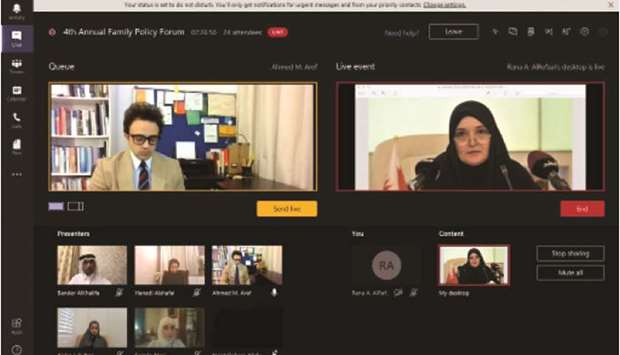Qatar is working towards a new child protection law which will strengthen its capacity to monitor abuse aimed at children, a webinar organised by Qatar Foundation’s Doha International Family Institute has been told.
The institute’s 4th Annual Family Policy Forum, titled Domestic Violence against Children in the State of Qatar, was held on the International Day of Families. Speakers highlighted international best practices in child protection, how to address gaps in safeguarding the youngest members of society, and the most important measures that must be taken to address domestic violence against children.
With participants including family policy experts, researchers, and decision-makers from Qatar, the event saw Najat al-Abdullah, director of the Family Affairs Department at the Ministry of Administrative Development, Labour and Social Affairs, say, “We are currently looking into establishing a new law to protect children, which will constitute a comprehensive legal framework for monitoring cases of violence against children in Qatar.
“Once it is completed, approved, and issued, it will constitute a major achievement in the field of child protection in Qatar.”
Al-Abdullah highlighted the role played by various elements within the Ministry that contribute to reducing the threat of domestic violence against children, through measures such as Qatar’s Family Law, Social Security Law, and Law of People with Special Needs.
She also emphasised the importance of the programmes, plans and events implemented by the Ministry, together with its partners, to provide an integrated system that supports the emotional and mental well-being of children in Qatar.
Aisha Sultan, a researcher at Doha International Family Institute (DIFI), told the online forum that the role of the family in dealing with domestic violence starts from the decision to have children - a decision that must take into account the family’s psychological and economic situation, to avoid any future challenges that may affect the upbringing of children
“Parents learn modern education methods, consider the child’s personality, and adopt a method of containment and acceptance as an alternative to bullying, all of which contribute to reducing domestic violence,” she said, adding that laws and policies have a role in creating a culture and imposing restrictions that deter acts of violence against children. She also emphasised the importance of creating a database documenting reported cases of violence against children, saying: “It is necessary to provide a database that includes all numbers and statistics concerning cases of violence that are reported in Qatar, because this will support researchers in the field of family and child studies produce research that evaluates the situation and helps to limit such cases.”
Sajeda Attari, child protection specialist, Unicef, also participated in the webinar and outlined the most important measures that she believes Arab countries should take to combat domestic violence against children. “Obstacles that prevent countries from implementing child rights laws that have already been ratified must be removed,” she said.
“It is also necessary to address any social values and norms that permit violence against children, work to create safe environments that protect children outside the home, and strengthening the economic situation that families face, all of which will help to reduce cases of violence against children.” Attari also said that providing hard data and evidence regarding reported cases of violence enables countries to “accurately assess the reality”, rather than focusing only on “exceptional” cases of violence.
Speakers also included Hanadi al-Shafei, Head of the Human Rights Treaties Department at the Ministry of Foreign Affairs, who addressed the legal dimensions of the ratification of human rights agreements by Qatar and the Convention on the Rights of the Child; and Bandar al-Khalifa, Legal Consultant at the Centre for Protection and Social Rehabilitation, who spoke about the need to have “clear mechanisms” to protect children from risks.

The 4th Annual Family Policy Forum in session.
